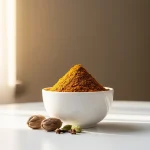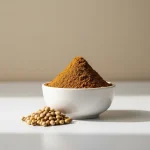
Navaratri is one of the most lively festivals of India, celebrated for nine days with devotion, enthusiasm, and super delicious food. Everyone decorate their homes with golu, visit temples, perform daily prayers, and participate in events like dandiya and Garba. Each day in navarathri is dedicated to a certain form of the goddess.
As with any other Indian festival, pray, food and togetherness play an important role during this time. Unlike other festivals where elaborate feasts are common, Navaratri focuses on eating light. Many people observe fasting as a way to cleanse the body and mind and to stay focused on prayer and devotion.
But, why fast during Navaratri?
Fasting during Navaratri is not just a ritual. It is a practice with traditional, scientific, and spiritual meaning. Traditionally, it is believed that fasting helps the body prepare for seasonal change, when digestion might get naturally weaker due to seasonal change. Navaratri falls during the transition from monsoon to autumn and eating light and right at this time helps the body reset and adapt.
From a scientific perspective, fasting gives the digestive system a break, supports natural detoxification, and helps restore balance. Studies show that intermittent fasting can:
- Improve metabolism and gut health
- Stabilize blood sugar
- Reduce inflammation
- Improve mental clarity and focus
Spiritually, fasting is meant to quiet the body and mind so that prayer and meditation become deeper and more focused on these auspicious days. It encourages self-control, and mindfulness that truly align with the essence of any festival. Navaratri fasting is not about starving, it is about eating pure, high-energy foods that are light yet nourished.
What could we eat during this Navaratri Fast
Fasting is an opportunity to give your body light, wholesome, and nourishing foods. Eating fresh, seasonal and light food help to balance festive vibes and energy levels throughout the celebration. Here are some light options you can include during the fast:
1. Fresh Fruits
Fruits are one of the best foods to include while fasting because they are light, hydrating, and packed with natural vitamins and minerals. They give instant energy without putting strain on the digestive system.
To make your fruit bowl on fasting traditional and more flavourful, you can sprinkle a little jeera powder, chilli powder, or raw mango powder that also make digestion easier.
2. Dry Fruits & Nuts
Dry fruits and nuts are a great source of protein, healthy fats, and energy. They keep you full for longer and give steady energy through the fast.
For best results and easy digestion, soak them overnight, grind it with our magic moringa powder that allows the body to absorb nutrients faster.
3. Milk & Milk Products
Milk and its products are traditionally consumed and are a good choice during the fast. A warm glass of milk with a pinch of turmeric can be soothing, while a large glass of buttermilk with a little jeera powder or dry ginger powder helps in digestion and hydration.
4. Coconut
Coconut in all its forms is a must-fasting food. Tender coconut water keeps you hydrated, grated coconut can be added to fruits or salads. And the raw slices can be the best substitute for crunchy cravings.
5. Honey
Honey is a natural sweetener that provides instant energy without feeling heavy. It can be added to lukewarm water, herbal teas, or drizzled over fruits.
Best Practices to End the Fast
The way you end a fast is just as important as how you keep it. After giving your stomach several hours of rest, reintroduce food gently so your body adjusts without discomfort.
Start with Water
Begin with a glass of lukewarm water. You can add a pinch of cumin powder or a few drops of lime to wake up your digestive system and hydrate your body. A soothing Ragi java with our authentic Ragi powder could also be considered.
Have Something Light First
Start with a portions of fresh fruit. It is easy to digest and gives your system a gentle boost of natural sugars before your next meal.
Move to Simple, Balanced Foods
When you are ready for a meal, choose light combinations — something with natural carbs, protein, and a little healthy fat. Use mild spices and a small amount of ghee to make it easier on digestion. You can try instant dosa, Upma, pulihora, tomato rice or quick kootu mix to make things quick so that you don’t feel tired.
Avoid Overeating
It’s natural to feel hungry and want to eat more after fasting, but overeating can make you feel heavy and tired. Give your body a few hours to settle before having anything heavy.
Closing Note
Navaratri fasting is not about skipping meals — it is about aligning with nature, eating clean, and creating space for renewal. When done with care, it leaves you feeling lighter, calmer, and ready to celebrate the festival with full energy.
In our next post, we will share ideas for what you can cook to turn the day after a healthy fast into a festive feast — simple, flavourful and traditional recipes that bring the family together and make the celebration memorable.



















